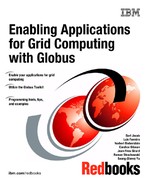3.4. Programming language considerations
Whenever an application is being developed, the question of the programming language to be used arises. The grid environment may include additional considerations.
Jobs that are made for high-performance computing are normally written in languages such as C or Fortran. Those jobs whose individual execution time does not play the most important role for the application, but whose contents and tasks are of more importance, may be written in other languages such as Java, or in scripting languages such as Perl.
Within a single grid application one might even consider writing various parts in different languages depending on the requirements for the individual jobs and available resources.
Some of the key considerations include:
Portability to a variety of platforms
This includes binary compatibility where languages such as Java provide an advantage, as a single binary can be executed on any platform supporting the Java Virtual Machine. Interpreted languages such as Perl also tend to be portable, allowing the application to run no matter what the target platform.
Portability of source code can also be considered. For instance, one may decide to develop an application using C, and then compile it multiple times for a variety of target platforms. This will require additional work by the infrastructure to ensure that appropriate executables are distributed to any target resource.
Run-time libraries/modules
Depending on the language and how the program is linked, there may be a requirement for run-time libraries or other modules to be available. Again, the successful running of an application will depend on these libraries being available on, or moved to, the target resource.
Interfaces to the grid infrastructure
If the job must interface with the grid infrastructure, such as the Globus Toolkit, then the choice of language will depend on available bindings. For example, Globus Toolkit V2.2 includes bindings for C. However, through the CoG initiative, there are also APIs and bindings for Java, Perl and other languages. Note that an application may not have to interface with the Globus Toolkit directly, as it is more the responsibility of the infrastructure that is put in place. That is, given an appropriate infrastructure, the application may be developed such that it is independent of the grid-specific services.
One of the driving factors behind the OGSA initiative is to standardize on the way that various services and components of the grid infrastructure interface with one another. This provides programming language transparency between two communicating programs. That is, a program written in C, for example, could communicate with or through a service that is written in another language.
